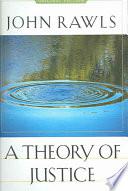Source: A Theory of Justice (1971; 1975; 1999), Chapter II, Section 10, pg. 58
Quotes from book
A Theory of Justice

A Theory of Justice is a 1971 work of political philosophy and ethics by John Rawls, in which the author addresses the problem of distributive justice . The theory utilises an updated form of Kantian philosophy and a variant form of conventional social contract theory. Rawls's theory of justice is fully a political theory of justice as opposed to other forms of justice discussed in other disciplines and contexts.
Source: A Theory of Justice (1971; 1975; 1999), Chapter II, Section 13, pg. 79
Preface, pg. xii
A Theory of Justice (1971; 1975; 1999)
“We may suppose that everyone has in himself the whole form of a moral conception.”
Source: A Theory of Justice (1971; 1975; 1999), Chapter I, Section 9, pg. 50
“Clearly when the liberties are left unrestricted they collide with one another.”
Source: A Theory of Justice (1971; 1975; 1999), Chapter IV, Section 32, p. 203
Source: A Theory of Justice (1971; 1975; 1999), Chapter II, Section 12, pg. 73
“An intuitionist conception of justice is, one might say, but half a conception.”
Source: A Theory of Justice (1971; 1975; 1999), Chapter I, Section 8, pg. 41
Source: A Theory of Justice (1971; 1975; 1999), Chapter II, Section 16, pg. 95
Source: A Theory of Justice (1971; 1975; 1999), Chapter IX, Section 81, p. 540
Source: A Theory of Justice (1971; 1975; 1999), Chapter II, Section 15, pg. 93
Source: A Theory of Justice (1971; 1975; 1999), Chapter III, Section 26, pg. 157
Source: A Theory of Justice (1971; 1975; 1999), Chapter III, Section 22, pg. 126
Source: A Theory of Justice (1971; 1975; 1999), Chapter IX, Section 83, p. 554
“The suppression of liberty is always likely to be irrational.”
Source: A Theory of Justice (1971; 1975; 1999), Chapter IV, Section 33, p. 210
Source: A Theory of Justice (1971; 1975; 1999), Chapter IV, Section 35, p. 218
“Justice as fairness provides what we want.”
Source: A Theory of Justice (1971; 1975; 1999), Chapter III, Section 30, pg. 190
Source: A Theory of Justice (1971; 1975; 1999), Chapter II, Section 17, pg. 102
“Justice is the first virtue of social institutions, as truth is of systems of thought.”
Source: A Theory of Justice (1971; 1975; 1999), Chapter I, Section 1, pg. 3-4
Context: Justice is the first virtue of social institutions, as truth is of systems of thought. A theory however elegant and economical must be rejected or revised if it is untrue; likewise laws and institutions no matter how efficient and well-arranged must be reformed or abolished if they are unjust. Each person possesses an inviolability founded on justice that even the welfare of society as a whole cannot override. For this reason justice denies that the loss of freedom for some is made right by a greater good shared by others. It does not allow that the sacrifices imposed on a few are outweighed by the larger sum of advantages enjoyed by many. Therefore in a just society the liberties of equal citizenship are taken as settled; the rights secured by justice are not subject to political bargaining or to the calculus of social interests.
“We cannot at the end count them a second time because we do not like the result.”
Source: A Theory of Justice (1971; 1975; 1999), Chapter III, Section 23, pg. 135
Context: The claims of existing social arrangements and of self interest have been duly allowed for. We cannot at the end count them a second time because we do not like the result.